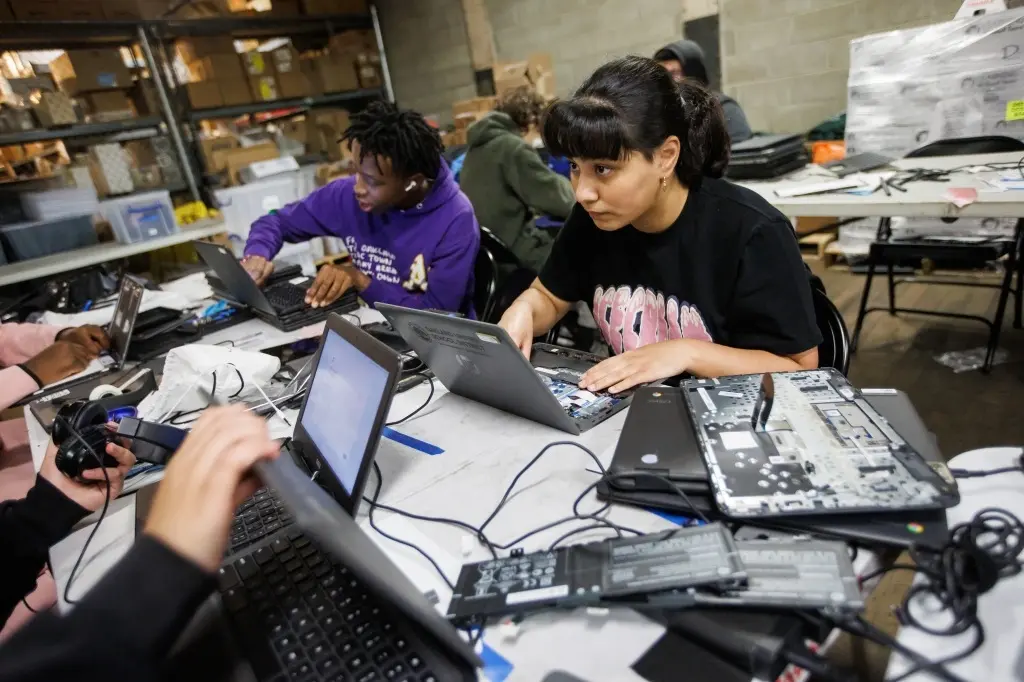There are few things quite as emblematic of late stage capitalism than the concept of “planned obsolescence”.
“These updates depend on many device-specific non-Google hardware and software providers that work with Google to provide the highest level of security and stability support,” said Peter Du, communications manager for ChromeOS. “For this reason, older Chrome devices cannot receive updates indefinitely to enable new OS and browser features.”
Bull. Shit.
I have an 8 year old iPad that can still use Amazon video and can still run Netflix, and google drops support for these computers as early as 3 years. I’m not an Apple fanboy but that is absolutely ridiculous.
Apple does the same thing if you don’t already have those installed
My 2nd gen Apple TV is garbage. Nearly all the apps fail to load now. 🤷♂️… I suppose I can try jailbreaking it but it sure feels like someone is trying to force me to upgrade my hardware.
That’s a product that hasn’t had an Apple update since 2014. What realistically do you expect hardware manufacturers to do with actually old hardware? Lose money supporting it forever? This is kind of the opposite case from the chromebooks.
I will give credit to Apple on that one because android phone manufacturers are now supporting their phone for longer because of how long Apple is supporting them.
I think the more probable reason is that EU regulators were unhappy with this for a long time and have now put 3 years of OS updates and 5 years of security updates into law. Low cost Android manufacturers don’t care what Apple does.
But for their laptops the support has dropped to the lowest in years. Some intel MacBooks no longer get the latest version after 6 years.
Confused noise from people who grew up using Windows 95.
I remember back in the day when I had apple devices where they would push updates for devices long past their capability to actually run the updated software. Rather than refuse the update or get a pruned patch with security fixes only, it would force updates and bloat your phone and grind it into unresponsive unusability after a few years.
I hear that’s not so much the case anymore, so that’s nice. But I remember. The main reason I upgraded my phone was because of that, the hardware was great, but I could hardly use the software anymore even after clean installs.
My point being, I guess, extended support is great if managed properly but it can also become a bludgeon with which to drive you toward the new generations of devices.
long past their capability to actually run the updated software
Well, Apple intentionally slowed those devices down to make the users update, instead of using an insecure device, that would’ve provided a good experience otherwise.
And these days Apple is retiring devices arbitrarily for profits too. For example this year they are retiring the Iphone 8, which has better hardware, than the ipad 2018 that is still being supported…
That slowness was, at least officially, for the battery health. Do you have the support to prove otherwise?
These conversations bring the weirdest people out of the woodwork. I remember talking with a guy who explained to me how crap Apple laptops were because you (according to him) can’t customise them. Turns out he’d never owned or even used an Apple laptop. I was like, why do you care?! Especially about something you have no experience with!
The problem is that those people often can’t read. Everyone has a biased opinion or two they forgot to back up with support, but those people can’t be argued with. I want to know how to talk with them.
And then if I recall correctly (though I can’t be bothered to look) didn’t they get sued for slowing phones?
So people were mad that their phones battery wasn’t holding a charge anymore, “im being forced to upgrade”, so Apple throttled older phones to keep the battery running, aka allowing people to keep their phones longer, and then they got sued for slowing down phones lol.
I am an apple fan boy, I wont hide that. But it does seem like they tried to do a “good” and make peoples phones last longer, and then got sued.
Also the whole forced upgrade just isn’t apples game IMO. Do they want you buying the new one every year, of course. But the more important thing is that you keep using AN iPhone at all. Stay in the ecosystem, stay in the app store, stay paying for icloud, etc.
Going to a new phone gives the user a window to move away from IOS. (Though most won’t haha)
Actually yes. I bought a brand new -discounted old stock- Iphone 4s for my mum near the end of the ios 8 cycle. The day before we installed ios 9 on it, it had okay performance and good battery life. Following the update to ios9 the performance went to complete shit. (the battery remained usable for 2 more years after, but it was not a good experience for her)
How does that prove that it was not for your battery health?
Huh? I have an ipad mini and since two-three years ago it’s as useful as a brick, Apple doesn’t allow me to install any app because they require a newer os version (that’s not available for the model)
By contrast my much older nexus 7 can still use most apps that I want
It can’t run everything obviously but the fact that my nearly 10 year old iPad can handle video streaming still and these schools have bricked laptops after 3 years is ridiculous.
Those Chromebooks aren’t bricked. They simply don’t get chrome updates anymore, even if it’s just Linux+Chrome and updates could continue forever without any real effort from Google
For security issues they can’t give to students unsupported hardware. The discontinued iPad would go in the same e-waste bin, because it’s not like android where browsers will continue to get updates for years and years
For a school they functionally are. They can’t use them if they can’t get security updates.
and instead the ipad that doesn’t get security updates since 2018 in your example doesn’t count?
Well for starters it wasn’t purchased by or for schools so no. But even if it was, it gets far more than 3 years of support. I think 5 is somewhat reasonable if we’re just going to accept this sort of behavior.
Either way the comparison is not really apt. Mobile devices are far worse about this than PC’s. You should instead compare a macbook (or a cheap windows machine), which gets security updates for 7-10 years. Google knows their devices are very popular for school computers, so to treat them like mobile devices and enforce the terrible standards that comes with is pernicious.
You’re also not a giant customer who needs security and it services like a school district. 3 years might be early, idk, but in plenty of enterprise or institutes replace their hardware every so often.
My 2012 laptop runs windows 10 perfectly fine and has the latest security updates. We’re way past the point of using hardware limitations as an excuse for companies to drop support early.
I don’t see why a school should have to replace their basic computers with an equally basic computer after 3 years unless it’s broken beyond repair. I don’t think the OS itself is doing much more than what an enterprise copy of windows does for security.
The only reason Windows 11 can’t run on super old hardware is because of the misleading decision to require secure boot (a feature of the motherboard that stops unsigned OSes from booting). The metaphor I use is that it is like a car radio manufacturer refusing to let a car radio work in cars that don’t have car alarms then calling the radio secure because of it.
The secure boot requirement can actually be circumvented pretty easily
Give me the deets please 👍
Yeah, Windows 11 is a bad example of supporting old hardware because Microsoft stupidly and maliciously requires secure boot and TPM2 just to lock out otherwise fine hardware from using Windows 11. You can run Win11 without secure boot or TPM2 with mods, the hardware is perfectly capable.
Or just put Linux on it. Linux runs on damn near everything because it’s designed to run on damn near everything. There’s no profit motive to only support Linux on the newest and shiniest devices like there is for Apple, Google, Samsung, and even Microsoft (who sells most copies of Windows preinstalled on new PCs).
How do I go about running Win 11 without secure boot? I have a BIOS motherboard from 2009. Windows 10 is EOL relatively soon. I plan on getting a new computer and using some genre of Linux but I’m curious what to do about the current one.
Funny you should say this. I have a 2012 Retina Macbook Pro, and yes it is running Windows or Linux with all the latest updates. However, Apple stopped supporting it in 2020. It’s too old for MacOS updates.
I’ve even seen a guide that will allow me to hack past the normal BIOS restrictions/allow me to put Windows 11 on it.
deleted by creator
deleted by creator
has to be dumped
OpenCore Legacy Patcher, Linux, ChromeOS Flex, and maybe even Windows 10 could all be options for that Mac. As-is ot would still be perfectly safe to use offline too.
What year is the mini from? I run a Plex server off a 2010 Mac mini.
Apple devices are serviceable for far longer after the OS stops updating than windows/android devices in my experience. But regardless, Apple doesn’t discontinue support as early as 3 or 4 years. Even you have to admit that is ridiculous of google.
I have a 15 year old laptop that can still browse the web and play YouTube videos just fine because PC is a standardized platform with an open standard bootloader and a BIOS/UEFI system designed to abstract the hardware so the OS doesn’t have to be tailor-made to the hardware. Mobile devices are absolute shit in this regard. Why does the OS have to be specifically built to target one particular device?
It shouldn’t. End of question. This applies to Android, ChromeOS, and Apple devices equally.
I’m glad mobile Linux is starting to take off and there seem to be some standards emerging around ARM booting, even if it is still an absolute shit show compared to the standardization of UEFI/BIOS on x86/x86-64. I know some ARM systems can UEFI boot but it’s few and far between still so most devices still need a tailored kernel at least. That said, ARM Linux doesn’t need the entire freaking stack tailored to a device like Android and iOS do.
Couldn’t agree more. Every computer I have, no matter how old, can connect and do most things fine.
Weeell “bullshit” is easy to claim but not necessarily untrue. So with android phones this is definitely a problem. Industry wide firmware support for these ARM SOC-s are often ranging from not long enough, to fucking atrocious. You get basically two years of new drivers, and a security update maybe. The way LinageOS manages to support phones like the note 3, from like android 4, to 11, is basically creating manifests, that use drivers from newer, still supported, but “similar-ish” components. And the note 3 was a flagship device, easily the fastest phone of it’s generation. These Chromebooks, especially the ones schools can and do afford, are built to the penny. There is ultimately no point in pushing a software update to a device for a significant cost, that makes it so slow that no reasonable person would ever consider using it.
What is the solution to this? Hard to say. Not buying hardware so incredibly obsolete that it has to run an alternate OS, is a start. Maybe just use PC-s and deploy linux.
The solution is to let people use the device in any way they want and can. Software should not dictate hardware obsolescence.
If I’m reading this correctly (and you need to read between the lines a bit), it’s not that they literally don’t work, it’s that they aren’t capable of getting security updates. For playing Minecraft, who cares, but schools are legally obligated to keep private student information (like all their schoolwork) secure.
It’s not like there’s a LineageOS for Chromebooks and standardized firmware and drivers that can be easily deployed and updated. They mentioned in the article that open source alternatives were trialed, but that they lacked needed features and were very costly (in time, presumably) to get working.
This is just a shit sandwich all around.
From another perspective, several schools I’ve worked at have had so much vandalism and theft of Chromebooks that they won’t even consider replacing them with more costly future-proof tech. It doesn’t matter if they get 8 years of software support if students break most of them in years 1-3.
It’s not like there’s a LineageOS for Chromebooks and standardized firmware and drivers that can be easily deployed and updated. They mentioned in the article that open source alternatives were trialed, but that they lacked needed features and were very costly (in time, presumably) to get working.
You can run Linux on them, it’s the cost of getting a bunch of shitty ass chromebooks done that’s not worth it for schools.
This is exactly the issue for me. Devices used by 10-18 yo students do not last 10 years, and so it doesn’t matter if they get software support for that long.
My 12 y/o has gone through 3 Chromebooks since the pandemic, but they are $50 refurbished so who cares
Edit I have a gaming rig, and he uses the GeForce cloud gaming service on his Chromebook, and he loads into Fortnite faster than I do when we play duos
But they kinda sorta do. It is not like Chromebooks are locked down like an iPhone. I had an old Samsung Chromebook, you could just turn off trusted boot with a flick of a switch (okay it did reset your device), and just run what you wanted. It’s just with arm based stuff running what you want is not trivial. You run what you can which is often nothing.
FYI Most Chromebooks are Intel CPU computers, there are a few arm based ones but majority are Intel x86_64.
Aren’t most Chromebooks out there Intel CPUs and essentially PC hardware? I know there are a few arm ones but it’s not most of them.
Fuck these Corporations, the only reason for this is to get the public school systems to constantly buy new chromebooks.
That’s what they should be doing, but it isn’t what they’re going to do, unfortunately.
Kimathi Bradford, a 16-year-old Oakland tech repair intern, has looked into whether there was a way to replace the outdated Chromebook software with a non-Google brand, but it ended up being a lot of work, Kimathi said, and the open-source replacement wasn’t up to par. “It’s like the Fritos of software,” he said. “No one really wants to use it.”
Now, I’m not sure if what they tried was Linux, but I wouldn’t be too surprised. The younger generations grew up with smartphones; I feel as though operating systems will become more streamlined and opaque as time goes on. I suspect we’ll have to contend with the phonification of mainstream computing in the coming years.
As a lover of Frito pie, I take offense to this
I take offense to the idea that there is something called Frito pie, and worse, that your comment leads us to believe, hopefully errantly, that somebody has concocted such an abomination.
Why would you subject yourself to eating something that’s famous for smelling like the bacteria that festers between dogs’ toes: https://be.chewy.com/is-this-normal-why-do-my-dogs-feet-smell-like-fritos/
It’s not a sensible path for a school with budget constraints (which is most schools). They would need to come up with a new MDM solution because they can’t manage their computers with Google anymore. So their IT costs would increase dramatically, probably more money than they would save by keeping the old hardware alive. The simplest path forward is to just buy new Chromebooks.
I haven’t (will never) had the experience of owning chromebook as a student, what does the MDM will do here? Cheating prevention?
deleted by creator
I wonder what it would look like without these measures?
Back in My Day™, we had minimal MDM on the school computers.
Yes, the kids that wanted to fuck around (look at porn, download music, play games) fucked around, but they would have the old-fashioned way, anyway. The most common thing was just changing the desktop photo to a Lamborghini, or something. Anyway, we turned out…. Well… not necessarily ok, but I don’t fault the computers for lack thereof where applicable.
Admittedly, these weren’t personal laptops but just ones in the library or computer labs, but still.
Mobile Device Management, aka the administering of software to a fleet of devices.
Same thing it does for any instution that loans out hardware, e.g. employers:
-
monitoring
-
remote lockdown / wipe
-
remote management of installed software
-
etc.
-
What kind of monster doesn’t like Fritos?
deleted by creator
Right, but then multiply that guide x1000 systems, losing google enterprise, switching over to a unix directory system, setting up infrastructure, network shares, printers, and everything and it’s not just a guide - it’s a team of people working for weeks to get it set up. Of course to us it’s easy, it’d just be a computer or two. To an entire company/school it may be over a million dollars to swap over
Agree. I’ve got a chromebook running Linux, for that I had to open it up and remove a screw. It takes around 15 minutes if you’ve done it before, so for bulk migration to Linux it’s not feasible.
You had to remove a screw to install Linux? Is that like a physical tampering prevention measure? Makes me think of how I had to swap a jumper to install a GPU in an old HP tower that had integrated video.
Yes it’s exactly that, check out this documentation.
You’re saying it’s over a million dollars to revive some chromebooks? Or to build out a system that is independent from planned obsolescence? For a school district that has to operate in the long term, I think one of those is a bargain.
Also, the cost of maintaining 2 vs 1000 systems obviously scales up, but it’s obviously not nearly linear. The difference in cost between managing 1000 and 2000 systems would be negligible.
The plan on a large scale with a team sounds good, but IT at schools is a total mixed bag due to budget, etc. I’ve seen some schools where IT is just burnt out and underpaid (can’t tell which came first) and sometimes the IT team will be an old head that still reminisces about Windows NT.
It would be cool if there was an independent team that resurrected those laptops for schools. I think the problem that arises though is security.
Right, for a huge enterprise they would probably honestly consider it, but a school with ~1000 students? Less? It’s going to be cheaper to trash those and get new ones. Don’t get me wrong I think it’s a terrible waste and Google is horrible for putting them in this situation, and I’d love for the open source community to offer some scripts for wiping, installing ubuntu, setting up ACLs, connecting to a domain, connecting shares, etc, but still most schools are going to see this and just say “Okay google how much money do you need for us to keep working?”
I’ve heard of CS majors coming in these days not knowing what a filesystem is.
so they think that reformatting is wiping the drive clean instead of recreating ntfs/exfat metadata files
A decade or more of kids growing up with shitty toy computers instead of real computers will do that. Mobile OSes, in their ridiculous pursuit to dumb down the computing experience, have dumbed down the computer users.
There seems to be a sweet spot in age where you grew up with actual computer experience. Young enough to actually grow up with computers in your household and school but old enough for those computers to not be toy mobile crap.
I’m very glad mobile Linux phones exist now. Having a real computer in my pocket rather than some awful imitation of what a computer should be is refreshing. I always wanted a pocket computer as a kid, but then when it actually happened it felt nothing like a computer unless you hacked it.
The first PC my family had, and thus first computer I had extensive experience with, was a Dell Pentium 4 running XP. Yeah, obviously I used a file system implicitly, but I remember thinking later when I entered college and the workforce that I was deprived of learning how to use a “real” computer because I didn’t get to experience the consumer PCs of the 80s. I didn’t have experience with a C64, I didn’t need to learn BASIC or a command line just to use the computer. As a user, understanding how reads and writes to disk happened, and how to make the best use of my working memory wasn’t necessary, the OS handled it all. I just needed to know to click “eject” first. And yet I’m doing fine (I think :D).
My point is, every generation will be able to say “I grew up with a dumbed down computing experience”. But I’m more optimistic about this I think. I welcome a generation of computer scientists who think completely differently about how files should be organized. It’s not important that I know BASIC, and maybe it’s not important that today’s students think in terms of file systems. They’re still smart people, they’ll still need to learn trees and graphs to solve problems. They just won’t be pre-programmed with assumptions and requirements that may not exist anymore or in future hardware.
deleted by creator
Sorry but Fritos of software is dumb & in no way representative of bringing old chromebooks back to life beyond their support date.
Schools often buy the bottom baseline of everything & in now way was a 4gb of ram a good, decent or proper experience to begin w/ & their replacements probably also had 4gb of ram - just a faster cpu, gpu & ram to hide that it’s lacking ram still.
I think schools could easily band together & make their own education focused Linux distro & then just focus on hardware that’s compatible w/ that’s Chromebooks or Windows laptops. Hard part would be building out an on par MDM &/or ldap server if not using a Windows server.
All Chromebook are is a browser basically. It already is the bag of Fritos imho. I think the hard part though would be to hire an IT guy that knows Linux better than the students tbh. Schools already under pay teachers in the US & that goes 2-3x for IT staff.
I mean, underpaid IT aside, do they need to be better than the students?
We like to organize school like there’s rules, you follow them, and if you do better it must be because you are better.
But thats not how the world works, and it’s not how technology works - it’s all about understanding the system and looking for loopholes
Is it better to enforce absolute control though? It teaches you nothing but how to be a good cog in the machine.
Teaching you that the rules aren’t absolute, but requires skill and legwork gives you a mindset to actually succeed in our warped little resource allocation game. Instead you should teach them to consider the effects - if they crash the network, make school suck for everyone for a few days.
But as to your original point, you still need an admin who can at least manage the network, and they should be given the funds to pay for that
Well, given that android would be Unix based he was probably talking about a Linux distro being a lot of work, which it can be if applied to individual computers, instead of a network.
@UngodlyAudrey @cerement there’s chrultrabook project focused on allowing to install Windows or Linux https://chrultrabook.github.io/docs/
@selfisekai @UngodlyAudrey @cerement
Person you’ve linked to clearly didn’t bother reading the documentation.
Ubuntu is unsupported (any distro that sticks close to mainline will work).
RW_LEGACY doesn’t work correctly, newer models don’t use WP screws anymore.@elly @selfisekai @UngodlyAudrey @cerement To be fair, that Substack article was written in May, before Chultrabook documentation pages were written - and before that there were only some random pages and the whole Discord server.
I think that instead of pointing kiddos to Discord server and serving them one by one, the focus should be moved to polishing documentation, so everyone could at least throw a link to the part explictly noting that RW_LEGACY/Ubuntu/something other is broken/unsupportable .-.
@BluRaf @UngodlyAudrey @cerement @selfisekai Yep, that’s what we’re doing
I love this, the idea that the hardware is done once the software gives out is asinine. It’s also what companies have been selling us on for decades now. It’s long past time to rethink the idea of what hardware lifespan really looks like
Yes!! Chromebooks have so much potential.
I have a cheapo 2016 acer Chromebook still going strong with Gallium OS. (An ubuntu based distro geared at low spec chromebooks.)
I, on the other hand, have a Lenovo Duet 2 which sort of sucked the day I bought it and has hardly gotten any better. I wanted a new Android tablet for taking notes and reading comics and there was just nothing else decent available a year ago. Specifically got an ARM one so it would reliably run Android apps. Which it doesn’t – it’s so unstable. Have to reboot it regularly when stuff stops working. The promise of Android apps on ChromeOS was more of a hope than a pledge.
Good thing it was cheap because this thing has practically no future for me. I regret everything about it.
deleted by creator
same article mentions Chromebooks are a great alternative to Raspberry Pis – cheaper and come with a built in keyboard and screen for monitoring all your automation needs …
deleted by creator
Companies making mass market devices should be required by law to support them indefinitely, or until they publish the technical specs sufficient for community support and repair.
The upgrade cycle they’re allowed to get away with today is not only a ridiculous drain on people’s money, but also a shameful source of pollution and waste.
until they publish the technical specs sufficient for community support and repair.
I want to see phones with no further official OS support have their boot loaders opened up so a lightweight OS can be installed on them instead. I’ve had iPhones in the past that have been absolutely rock solid after a battery replacement that lost iOS support, and with that a whole bunch of resale value. So I now tend to sell mine a year or so before they’re likely to be dropped.
But I genuinely think that I’d hold on to an iPhone that could have an alternative OS installed. This is, of course, why none of the major manufacturers allow this. Gotta put the profits ahead of the ethics.
Actually in the Android community Sony helps you unlock your bootloader and offers official AOSP sources for their devices that you can compile and install yourself.
I have no idea why people are enamored with Samsung.
Ad campaigns, most likely. I always seem to see ads for Samsung phones, but not as often for Sony brand ones. I do agree Sony does a much better job about opening up the bootloader, versus Samsung punishing you for trying to open your own paid for device up.
Exactly, bootloader locking should be downright illegal. If EU wants to make phones last, they need to mandate that you can unlock the bootloader (WITHOUT bullshit like having to get an unlock code from the manufacturer). Want to lock it down for certain software features like payments, etc? Ok, fine, I can live with that, so long as I can unlock it if I so choose and keep all HARDWARE functionality intact.
On another note, the manufacturers should be upstreaming and mainlining their drivers in the Linux kernel. ChromeOS and Android are both built on Linux, yet they keep all their hardware support in forks and branches that are left to wither and die rather than submitting those changes upstream. Only a select few ARM SoCs have mainline support. If the companies would just put a bit of extra effort into doing things right rather than the shitty hack jobs they do now to get products out the door as fast as possible, we could have a much better ecosystem around old phones. Of course, the shittiness is by design.
Comments upon comments ignorant of the realities of the privacy laws governing this domain and the implications on firmware, driver and OS security support. “Just install Linux on it” is a completely unworkable solution. As some have pointed out, the places where this is done have a much thicker IT departments staffed with higher grade professionals to make it work. The thing to be mad here about is the shit support from vendors across the stack. If I had to guess, the worst offenders are probably the SoC vendors who typically ship firmware and driver updates as is the tradition.
deleted by creator
That’s exactly the problem. The standard GNU/Linux distro isn’t suitable to allow carrying the responsibility that an innumerable number of users with physical access won’t be able to pwn those machines. Machines that are used by others too. You absolutely can make an OS like that out of Debian or Ubuntu, or what have you. Google has - Chrome OS - but it’ll take a significant development effort. You’d have to basically redo at least some of the work they’ve done. And let’s say you did all of that. Then you end up deploying it on an ARM-based fleet. And there’s a wild vulnerability in the WiFi firmware blob, and the SoC vendor no longer supports it. Every student has root and we’re back to the original problem. 👨🚀🔫
And that’s why instead of getting hardware from a vendor and hoping for the best, you might want to get it in writing that they’ll support their crap till a date. Then you stamp that as the EOL date for that laptop and you present it as part of the spec to whoever might want to buy this laptop. There’s no escaping this problem unless there are no proprietary blobs on the system, which is unlikely for ARM, or you have a solid development team and you’re large enough to have a source sharing contract with the vendor that lets your team fix the vulnerabilities and support the hardware for as long as you like. It’s probably much easier to achieve on x86, which costs more per unit up front.
Thank you for sharing your experience along with that link.
deleted by creator
What difference would the kernel licence make in this context?
Yeah, bulk imaging computers is really only limited to how many you can hook up to the network. I used to have to image hundreds of computers a day at times, and really the longest part was walking around and restarting them all so they’d PXE boot. The actual process maybe took 2 hours since all the computers were on 100Mb/s connections.
I converted one of these Chromebooks to Linux as a test project and the results were, not good.
To start, they have a bootloader lock screw under the motherboard, so you have to take the entire laptop apart to load anything but unsupported ChromeOS.
Then you have to use a Google tool, can’t remember the specific one, to swap the bootloader. That might be possible to automate but I didn’t look into it because…
… The hardware sucks. We’re talking like 4GB of storage on a lot of these Chromebooks. The driver support is all over the place, and there are issues everywhere even on “supported” distros.
With the vast amount of junk Chromebooks out there, I’m sure community hospice support will get better, but it’s never going to be an easy bulk conversion because of how common the bootloader locks are.
I manage my schools IT - and when we started out a few years ago my board were pushing aggressively for Chromebooks. The service provider were talking about how they could roll out hundreds of Chromebooks at the touch of a button. When I asked about the lifespan of a Chromebook I got vague answers. I knew we would get a couple of years max out of each one so I instead pushed for much more expensive MacBooks. 5 years on and we are still using our original MacBook we got back then, with photoshop and other software.
I’m curious how something like Framework laptops would pan out for this use case. New they are currently priced similarly to a macbook, but in theory they are indefinitely serviceable.
This is true! And you also don’t have to worry about the proprietary-ness of MacOS, and there are also (certain ways)[https://github.com/Gictorbit/photoshopCClinux] to get photoshop on Linux too.
Framework laptops are the exact opposite of what you’d want in a school environment. This is how you blow your schools IT budget out the window. Cheap, disposable, consistent configuration and manufacturer supported are the key concerns.
These are kids with various standards of computer literacy throwing them in their bags which they also kick around and treat pretty harshly all day long. A $4k Framework-style laptop is just silly.
Not necessarily! The Chromebook version starts at 1k, with a no-OS one 50 below that, both pre-assembled. Additionally, the higher build quality with the ease of part replacements would significantly reduce the load when it comes to repairs. The downsides of course are the high up-front cost, but this could be reduced by releasing in groups (by grade level, for example.) Also, an advantage with unrestricted devices like this is that it’s very easy to flash/install whatever you want, including whatever user permissions and applications are needed to ensure smooth operation (e.g. specific DNS/VPN configuration for content blocking or access to school materials.)
Either that, or I’m speaking out my ass. Still though, there’s a lower carbon footprint involved when you don’t need to huck the whole device in the trash once something breaks. That should at least be some kind of incentive…
You can buy 2-3 cheap Chromebooks for that which will theoretically last 10-15 years though for your $1k. Basically no schools are going to turn that up vs a $1k Framework most of which will not last half that long with kids using them.
Sucks for the environment though as you say, I wish it were different.
My comment is in the context of someone who said they’re 5 years into their plan of buying MacBooks instead of cheap Chromebooks and they’re still happy with their decision. If they had said reality panned out as you suggest, then yeah, my comment would make less sense.
But then again, in theory, the more damage the laptops are going to suffer, the more you’ll save over time if they’re easily repairable
Also, you’re right that $4k for a framework is ludicrous. I was thinking more like $1500. But idk what MacBooks OP purchased.
Yeah, I don’t understand who’s buying these at all at that price to be honest. I’m not sure if its the profit margin they want or production-related issues due to the low number runs they’re probably doing.
Ironically the only way to use some old Macbooks these days is to put Chrome OS Flex on them. Apple is far more aggressive about killing off old hardware when it feels like it. You can still use them as-is of course but over time the browser and other web based apps degrade and refuse to work because of issues with TLS, CA certs (expired), discontinued backend APIs and unsupported web content APIs.
I have a 2015 fully specced 15" MacBook Pro that I’m trying to sell at the minute, which is proving more difficult than I thought it might, partly because the M-series Airs are so compelling, but also because it’s an incredibly powerful machine that’s officially locked to Monterey, which is now two years old.
Beyond Apple’s need for financial gains, I don’t think there was a compelling reason to leave that model out of the Ventura upgrades.
I had it running Ventura via OCLP, which it had absolutely no trouble with at all. But I can’t sell it in that state because while it’s pretty stable, there is still some extra fiddling needed with running an unsupported OS.
Monterey still gets security updates. :)
But they’re not as fun as feature updates!
For me issues have only really started around the 5-8 years mark depending on the device which is ok-ish since the hardware is extremely outdated then anyway.
x86 Macs are not the greatest example of longevity at this point.
Not ideal that we had a percentage of our MacBooks on x86 cpus when the M1’s came out. But I will say they are still running strong. Others have pointed out that newer OS updates won’t work on the older MacBooks. But that’s not a deal breaker for us as we don’t run anything that’s OS specific enough to make the older models obsolete. We have factored in 5 - 7 years of use out of the laptops and we’re on course for that. I myself and using a 10 year old MacBook at home, and although I can’t fire up the latest Adobe Premiere on it, I can certainly get 99% of my work done on it.
Really? I just handed down a 2017 MacBook Pro – still supported by Apple, meaning it runs the latest OS, and gets patches.
Can you give me an example of any other device with longer software support from the original vendor, at no cost to the end user?
deleted by creator
The problem comes down to education institutions. I remember when we got Chromebooks in my highschool (8 years ago) admins forgot to turn of developer mode and half the school unenrolled the Chromebook managing to bypass all restrictions. This went on for half a year until one day our school needed to run a state exam (more for measure of schools performance not as a college entrance exam or anything).
The computerized testing program required deploying a specific chrome app accessible when chrome book is logged out (can’t just download from chrome web store). When they tried to push the client since half of Chromebooks were unenrolled it failed. This required the school it to recall pretty much all chrome books to manually re enroll all of them and disable developer mode (prevents unenrolling and prevents sideloading Linux).
Problem is if older Chromebooks are used for Linux in an educational environment there would be nothing stopping a student from whipping up a bootable USB and dumping another distro (bypassing restrictions). I’m also not sure if there is a enrollment mode equivalent Linux (there may be but not sure).
At least that’s my two cents (not a school it admin just a memory from the past 😉).
I never really understood the need for that strickt controll of the hardware… Who cares if Linux is sideloaded or if students unenroll. Imho I think if you need that strickt controll you are bound to get so many unnesseary issues down the line. Instead let student 6se what ever the fuck they want and for security just make sure they WiFi/ethernet is secure and locked down and any services the students need are behind a secure 2fa login. Treat any device as untrusted is more healthy for your security in the long run imo. If students need special software that they can’t run on their own machines you can lend them a machine for that specific task for a specific time. Problem solved.
It’s because the school district is responsible for how the devices are used. If your kid gets around the content block and you, an ultraconservative, finds your kid watching porn, you are definitely going to do something about it.
And of course blame the school instead of the child at fault, naturally…
You blame the school instead of your parenting which is at fault*
Usually kids “misbehave” in public because of close-minded parents or parents who try to control their kid too much, and most of all parents who don’t encourage good behaviour correctly. Parents really like to blame their kid for behavioural issues when in reality they’re the reason it’s a problem. (Especially with e.g. people who have disabilities like Bipolar, Autism, ADHD, parents internally blame their kid for everything and punish the kid, even though the disturbances caused by the disorders are something you can address and help the kid with with good parenting)
I suspect most of the kids who do that kind of stuff are neurodivergent and either undiagnosed or not treated correctly by their parents and not given proper treatment
Don’t disagree at all, was just making a topical comment, not trying to do a deep dive
No way it’s the schools fault if the kid sidloads anothe os. That should strip the responsibility and it’s the parents problem. Ultraconservatives can just stfu. about this.
It should, yes. But that’s not going to stop them from trying. Enough noise from a “concerned parent” will make something happen more often than not.
This is why we can’t have nice things
I never really understood the need for that strickt controll of the hardware
Federal laws and rules for educational technology:
CIPPA - https://www.fcc.gov/consumers/guides/childrens-internet-protection-act
COPPA - https://www.ftc.gov/legal-library/browse/rules/childrens-online-privacy-protection-rule-coppa
and to an extent
FERPA - https://www2.ed.gov/policy/gen/guid/fpco/ferpa/index.html
Actually in your case our school has a BYOD program (bring your own device) in which you can bring your own laptop with whatever flavor of OS. Firewall would restrict you, your device would be considered untrusted, and in testing a loaner locked down chromebook would be provided. The issue comes with non BYOD devices.
Now lets assume a school has 1k students. If they allowed os unlocking and allowed students to tinker with the os. Then they would need 2k chromebooks 1k unlockable 1k locked down for exam administration (assume the whole school needs to take it at the same time). From a admin/IT perspective why should the school need to pay double the number of chrome books just for a few students to install their favorite brand of linux.
Even under the best circumstances where support queries aren’t increased (from students softbricking/ not knowing how to use linux) and say they are able to preserve 1k unlockable chromebooks, admins would still need to replace the other 1k locked down chrome books at end of software to stay in compliance with testing software (negating any financial benefit).
Problem is if older Chromebooks are used for Linux in an educational environment there would be nothing stopping a student from whipping up a bootable USB and dumping another distro (bypassing restrictions). I’m also not sure if there is a enrollment mode equivalent Linux (there may be but not sure).
They could just disable booting from USB drives in the bios and password protect it. They could install something like Fedora Silverblue, or even customize the image used to include whatever modifications they want. Any changes they made to the image would be propagated through autoupdates. Kids wouldn’t have root, so they couldn’t forcibly install a different OS. Of course they could install flatpaks to their home directory, which is probably something administrators would want to prevent, but a knowledgeable student can always find ways to do what they want.
This of course requires schools/districts to hire people to manage that stuff, which could be a problem.
Good point. I wasn’t sure if Chromebooks had a normal bios with password protect/option to disable USB boot for non chrom os operating systems.
(prevents unenrolling and prevents sideloading Linux)
Should note that it’s not completely foolproof, I know because I bypassed it. It’s just not easy and technically you can get in trouble for it. Never got a ‘vacation’ for it though 😕
Honestly people should stop buying Google products…
Chromebooks expire? What the fuck? Are there logistical problems with installing Linux on these devices?
Chromebooks are unfortunately meant to be disposable like phones. Nobody should buy one, but unfortunately schools get them because they’re cheap.
On an individual basis you can install Linux, but for millions of devices thrown out by schools around the world, there’s no solution because the residual value is so tiny, you’d have to pay the techs minimum wage and hold a gun to their heads to get enough devices per hour to justify it.
I used to work at a refurb place and when we saw a chromebook that wasn’t immediately OK (it could’ve had a bad display or keyboard, or locked to an account), we just removed the eMMC, smashed the chip and threw the device on our scrap pallet.
Give them to the kids with a QR code guide sticker about installing Linux on them? I’m not a kid, but I would love if someone “threw” a couple of these in my general direction.
Almost certainly not allowed, schools are responsible for privacy and security on these devices.
Any standard desktop linux is more private and secure than google spyware
And as soon as the IT guy at school installs Linux on these machines, he’s responsible for said privacy and security. And he’s a lot easier to sue than Google if something goes wrong.
This is exactly why right here, cost aside.
I would not hand out hundreds of Chromebooks to kids running some Linux distro I installed even if I could. It’s critical to have full manufacturer support in these types of environments.
Yes but there might already be personal data on them from the child, so they cannot give the chromebooks out before wiping them, which seems hard to do so they just bin em.
Most of these Chromebooks are 3-4 years old and in really rough shape. Kids use these things for literally everything. You likely wouldn’t even want them for free. Probably bio-waste at this point.
A friend asked me to fix their daughter’s desktop and also asked if she could borrow an old laptop to use in the meantime. The desktop was disgusting with food smeared all over the keys and display. I cleaned it up and fixed it and sent it back. My laptop was returned with food smeared everywhere after just a few days. I was stunned.
Phones shouldn’t be disposable either, I’m coming up on five years on mine.
They shouldn’t be, but they’re designed to be, especially Androids with their abysmal software support period.
I guess mine is unusual then. I still get very regular security updates, and battery life though noticeably shorter, well, it’s still okay.
Is there something preventing the use of ansible or similar, to handle the installs?
Ansible probably doesn’t change UEFI settings or switch off the hardware lock that some Chromebooks have for installing a new OS.
You have to remember that these things cost like 200 USD new and they’re utterly underpowered. By the time they stop getting updates, they have so little residual value, it’s literally not worth salvaging them.
I think its more that Google supports them for only so long and then they go bitrotten. The final update for these devices should also unlock the firmware so people can wipe the device and install Linux or something on it.
the Chromebooks with ARM processor (the majority of the cheaper ones) are notoriously known to be awful to install any alternative operating system
Not really, but it’s almost impossible for a school to pull that off and still get the support needed. Don’t forget that new Chromebooks are dirt cheap, after all discounts probably in the 100-200$/€ range. It’s (sadly) just not worth it salvaging them.
still using things like Google Chrome or Chromebooks in 2023 is actually reckless behaviour. stuff like manifest v3 and the web integrity api just prove that google will use their monopoly to take over the open internet
Yes, why have we as a society allowed Google of all companies to take over something as important as public education? It’s downright dystopian.
All of these machines make for decent Linux laptops. I picked up an EOL Chromebook for $35 last year and installed Debian on it. Decent little machine. Not terribly fast but very useable.
These are Linux laptops. But yes, they’ll work better if you put your preferred distro on them.
I turned one into an Emacs machine, it was £20 and I fucking love it. It’s built like a tank too. It’s a dell Chromebook 11.
deleted by creator
Good to know. Is it still a PITA to make the firmware let you change the OS?
Most modern ones it’s just commands you have to run. You can usually find an easy walk-though on the MrChromebox website. I haven’t seen one that required a jumper or anything in a LONG time.
Mine was really easy (dell chromebook 11), just followed the instructions and I had no problems. I have another chromebook with an amd chipset that I can’t change the firmware on though (last time I checked), so if you’re planning to buy one to convert make sure you actually can do it first.
Removed by mod
Sourcing Chromebooks from the Reviving Chromebooks with Ubuntu I posted elsewhere
easiest looks like just calling the IT department of your local school
Interesting article, I don’t think I have a use for them though.
Same here!
I agree that this is very bad on google’s part of course, however I don’t think the schools should just lie down and take it. As others have said, installing their own OS should be the way to go. It doesn’t need to be 1 person manually installing the OS on each laptop, there are Infrastructure automation tool like Ansible that can, once set up, manage installation and configuration of an arbitrary number of devices. All the device needs to do is launch a web browser from what I understand, and pretty much every linux distro should be able to do that. If they choose one with a friendly DE, then it makes it easier to use for the kids. The devices will most likely run much better on an OS without bloatware too.
I’ve been looking into getting a cheapo laptop to take outside, and Chromebooks caught my interest. However, literally everyone I spoke to about this idea recommended against it. After researching all the nuances to putting baremetal Linux on a $40 Chromebook (BIOS screws, firmware patches, etc), all so I could have 2GiB RAM and 16GiB of unreplaceable storage, I asked myself what the point even was. I might as well buy a(nother) Thinkpad T40 at that point.
Glad I didn’t go with the Chromebook. Got a 2018 HP secondhand from a local college. For a little extra money, I have something with superior construction, specs, and upgrade potential.
I was part of one of the first high school classes in the country to get chromebooks and oh boy were they AWFUL. Constant freezing, crashes, failure to boot them, all kinds of battery issues. For about six months we had teachers who relentlessly put their tests online and had us take t them on our chromebooks, but eventually most of them switched to paper because of the inevitable three-or-so students who would go “mine’s not turning on” or “the screen’s broken.” They were fragile as hell too. The school said we’d lose our warranty if we were caught using them without the case, but even when they were inside the case they would regularly come out with cracked screens and broken keys. The internet speed on them was atrocious too. Our school wasn’t known for ultra fast internet (in fact, some spots even were a cellphone data dead spot), but we had more than a dozen incidents of students using their phones to do assignments because the chromebook just wasn’t connecting. The school had one IT technician and four librarians for a school of about 750, and they were working pretty much overtime due to how often the chromebooks would break.
I remember at the start they said we only had one free repair and then every repair after that would cost us $50, but the school had to change it to 3 free repairs because everybody’s chromebook (including mine) broke.
Used laptops are the shit for basic web browsing.
I just found a Lenovo T470s at a flea market (Flea@MIT, for anyone in the Boston area), 6th gen i5, 2x4GB RAM, and 128GB NVMe, with charger and W10 license…for $100.
I bought a 1TB NVMe and a 16GB SODIMM for like $80. Dual-booting Fedora and W10 (fresh-installed…I don’t trust someone else’s installation). Since getting it (Fathers Day), I only needed Windows one time (Linux Fire Toolbox wasn’t working too well for me with my Prime-Day Kindle Fire).
As a plus, the battery life is supreme as well, and upgrading the ram and NVMe were stupid simple, as they are on most the Lenovo T-series.
I would agree that if you’re looking to buy a cheap computer an older Thinkpad beats a Chromebook by a long shot. Main benefit to Chromebooks is that if you get lucky you can obtain them for free, mine was permanently loaned to me by my high school (I didn’t technically steal it from them, they just never asked for it back). I would’ve much preferred an old Thinkpad with Coreboot but the Chromebook was free so I can’t really complain.
After reading all the comments, I’m just gonna say that if you don’t allow kids to tinker and do their thing, they will learn a lot slower and your “investment” will be left mostly unused. (age range proper hardware/OS of course.) The school policy is not doing the kids a favor, it’s a waste of time and tax money that you cultivate a generation of people get used to chrome book and google apps. That’s the ultimate purpose for school license being cheaper.
We’ve got young adults entering the workforce that cannot comprehend what a filesystem and directory structure is due to 10+ years of these sandboxed, guard-railed tech products.
I now understand that existential crisis that people become too dumb or not capable of operating technologies developed by previous generation.(like the Walle movie.)
Planned Obsolesce should be a crime
I would have agreed with that statement until I saw the most recent Technology Connections video about why the incandescent light bulb has planned obsolescence built in. Sometimes it’s not malicious but to actually provide a compromise leading to an overall better product.
I don’t think software death dates count, tho.
That wasn’t planned obsolescence though, it was an industry-created standard for the tradeoff between efficiency, brightness, and lifespan. Planned obsolescence is specifically when a product is made to break sooner than it needs to.
Software Death Dates strike me as more “Malware” than “Compromise”
Light bulbs aren’t planned obsolescence though, he even said as much in the video, light bulbs more akin to dish-soap which eventually runs out then a device made to be obsolete faster. They are consumable items, which run out or burn out, they are not expensive appliances with long lives, hell he even pointed out that some utilities gave them away for free.
but to actually provide a compromise leading to an overall better product.
Could you elaborate a bit more on that?
For incandescent lightbulbs, his point was that bulbs can burn fast and bright or low and slow, and standardizing on a lifespan of 1000 hours was a sweet spot between performance and longevity. For example, it makes 60W bulbs from different manufacturers more interchangeable and less prone to tricky marketing gimmicks like a “long life” 60W bulb that’s dimmer.
Thank you for explaining this concept. I still don’t see how it can be considered planned obsolescence, though. It looks more like a matter of optimizing the output and doing a tradeoff for more performance.
I see planned obsolescence as artificially limiting the longevity or repairability of a product, without any benefit at all, but with the intention of making it less durable. A good example could be locked smartphones without updates.
But perhaps, the definition of planned obsolescence is broader than i think.
TLDR: I’m still very suspicious of how that is quantified - “leading to an overall better product”.
Who quantifies that and how, on a case by case basis, especially in the form of Chromebooks or phones for revenant, popular examples?
Let’s say it was a laptop: I can see issues with lithium batteries perhaps reaching a cycle count that lead them to be dangerous. Wouldn’t that mean though you should produce a good that has replaceable batteries? Is the battery designed in such a manner on purpose?
Businesses with shareholders that live quarter to quarterly profit are the issue. There is no authoritarian legislator that reallocates resources like China did the last few years, for example, whether you like it or not.
The US relies on legislation to be passed to mandate the changes or prohibit a device from being built a certain way. That legislation can be lobbied for loopholes, have various people in power also own percentages of the companies, etc. Whether you agree with it or not, there are many checks and balances and simultaneously a lack thereof.












































